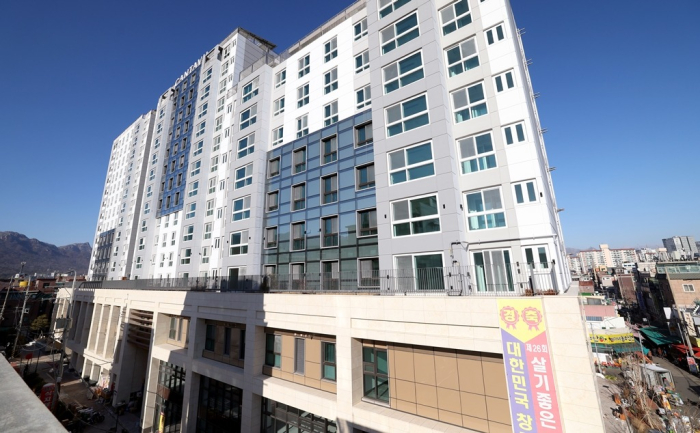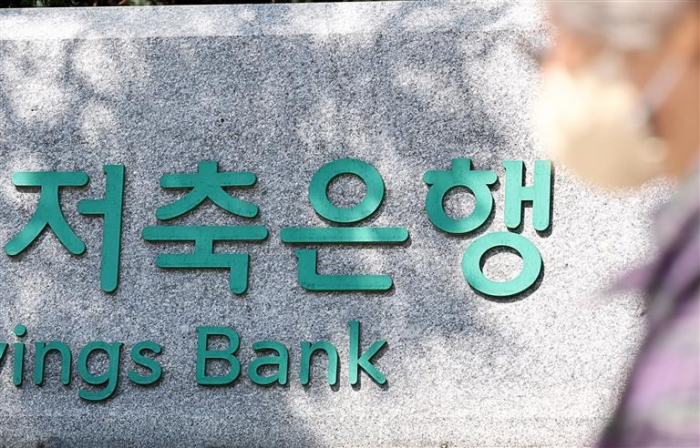Banking & Finance
S.Korea asks savings banks to raise capital to avoid crisis
About 15 out of 79 savings banks are estimated to have failed to meet BIS capital adequacy ratio requirements as of end-Q1
By Apr 15, 2024 (Gmt+09:00)
3
Min read
Most Read
Alibaba eyes 1st investment in Korean e-commerce platform


Blackstone signs over $1 bn deal with MBK for 1st exit in Korea


Korea's Lotte Insurance put on market for around $1.5 bn


OCI to invest up to $1.5 bn in MalaysiaŌĆÖs polysilicon plant


NPS loses $1.2 bn in local stocks in Q1 on weak battery shares



South KoreaŌĆÖs top financial regulator advised about 10 local savings banks in trouble to increase their capital by the end of this month to prevent an industry-wide crisis as project financing (PF) risks grow amid the sluggish property sector.
The savings bank industry plans to raise 70 billion won ($50.6 million), more than double the previous fund of 33 billion won, to stabilize troubled PF construction sites.
The Financial Supervisory Service (FSS) earlier this month asked savings banks with deteriorating financial soundness due to massive losses in the first quarter to further increase capital and raise their capital adequacy ratios to higher than recommended by the Bank for International Settlements (BIS), according to financial industry sources on Monday.
The BIS currently recommends savings banks maintain ratios of at least 10%. For banks with assets of more than 1 trillion won the recommendation is 11%.
The FSSŌĆÖ request is tougher than usual as the regulator normally gives more time to those lenders to increase capital, industry sources said. In general, savings banks report the ratios to the FSS within 30 days after their quarterly earnings and the watchdog asks them to complete their financial soundness improvements in three months, according to the sources.
ŌĆ£The regulator required us to report the soundness ratio once we completed the earnings statement at the end of last month while asking us to improve the ratio earlier than usual,ŌĆØ said an official at a savings bank that FSS requested to increase capital. ŌĆ£We need to take extra measures as the pressure is so strong.ŌĆØ
DETERIORATING
That came as the business environments and financial structures of savings banks worsened due to PF problems. The delinquency rate of saving banksŌĆÖ PF loans more than tripled to 6.94% at the end of 2023 from 2.05% a year earlier.
About 70 savings banks among the total 79 were estimated to have reported net losses in the first quarter. Last year, 41 of the total logged losses.
The capital adequacy ratios of some 15 savings banks were estimated to have failed to meet the BISŌĆÖ recommendation in the January-March period, according to industry sources. As of end-2023, only one savings bankŌĆÖs capital adequacy ratio fell below the threshold.
The industry is expected to suffer further in the second quarter due to PF-related problems and higher provisions, industry sources said.
ŌĆ£Savings banks whose major shareholders cannot afford to increase capital may be ordered to suspend operations or sell their businesses,ŌĆØ said one of the sources.

ADDITIONAL FUND
The savings bank industry is poised to set up another fund for stabilization.
The Korea Federation of Savings Banks, large savings banks and units of major financial groups earlier this month discussed establishing another fund of 70 billion won, according to industry sources.
The fund, which the industry aims to complete raising by as early as later this month, will be used to take over PF construction sites suspended due to the weak real estate market and non-performing loans to restructure and improve them to fund projects with business potential.
The savings bank industry spent all the 33 billion won raised last September on five projects.
ŌĆ£Once the second fund moves to acquire insolvent businesses one by one, other investors are expected to actively buy rather than just wait and see,ŌĆØ said one of the sources. ŌĆ£That will accelerate the overall restructuring.ŌĆØ
Write to Hyun-Woo Kang and Hyeong-Gyo Seo at hkang@hankyung.com
┬Ā
Jongwoo Cheon edited this article.
More to Read
-
 Banking & FinanceKorean savings banks swing to loss after 9 years
Banking & FinanceKorean savings banks swing to loss after 9 yearsMar 22, 2024 (Gmt+09:00)
2 Min read -
 Real estateKorean real estate firms put up for sale amid lasting market downturn
Real estateKorean real estate firms put up for sale amid lasting market downturnMar 12, 2024 (Gmt+09:00)
2 Min read -
 Corporate restructuringTaeyoung becomes 1st Korean builder in debt workout in decade
Corporate restructuringTaeyoung becomes 1st Korean builder in debt workout in decadeJan 12, 2024 (Gmt+09:00)
2 Min read
Comment 0
LOG IN


